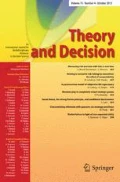Abstract
Hare (Analysis 70:237–247, 2010) proposes a view he calls prospectism for making choices in situations in which preferences have a common, but problematic structure. I show that prospectism permits the decision-maker to make a series of choices she knows in advance will lead to a sure loss. I also argue that a theory that permits the decision-maker to make choices she knows in advance will lead to a sure loss should be rejected.

Similar content being viewed by others
Notes
See Peterson (2009), pp. 165–168.
Gustafsson and Espinoza (2010) refers to Peterson’s money pump as a ‘non-forcing’ pump, as opposed to traditional ‘forcing’ pumps.
Nicolas Espinoza has an unpublished paper in which he argues that this is indeed how Chang, Griffin and Parfit should stop the pump. Espinoza argues that rationality entails a ‘status quo bias’, meaning that one should never swap unless the other option is equal in value or strictly better.
Broome (2000), p. 36 writes that, ‘the fact that you make a decision does not show that you have any rational grounds for the decision... your decision need not imply a subjective set of values that gives it grounds.’
I would like to thank Nicolas Espinoza and Johan E. Gustafsson for helpful comments on several drafts.
References
Broome, J. (2000). Incommensurable values. In R. Crisp & B. Hooker (Eds.), Well-being and morality: Essays for James Griffin (pp. 21–38). Oxford University Press, Oxford. Reprinted in Ethics out of economics (pp. 145–61). Cambridge University Press, Cambridge.
Gustafsson, J. E., & Espinoza, N. (2010). Conflicting reasons in the small-improvement argument. Philosophical Quarterly, 60(241), 754–763.
Hare, C. (2010). Take the sugar. Analysis, 70, 237–247.
Peterson, M. (2007). Parity, clumpiness, and rational choice. Utilitas, 19(4), 505–513.
Peterson, M. (2009). An introduction to decision theory. Cambridge: Cambridge University Press.
Author information
Authors and Affiliations
Corresponding author
Rights and permissions
About this article
Cite this article
Peterson, M. Prospectism and the weak money pump argument. Theory Decis 78, 451–456 (2015). https://doi.org/10.1007/s11238-014-9435-2
Published:
Issue Date:
DOI: https://doi.org/10.1007/s11238-014-9435-2




